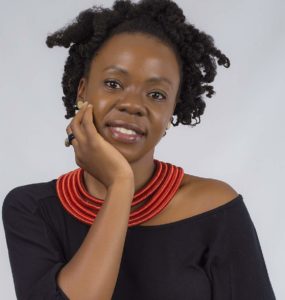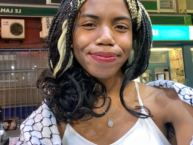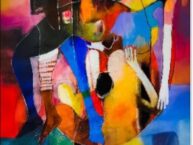 Mali Kambandu lives in Lusaka, Zambia, with her husband and two children. Mali’s writing influences are Alice Walker and Toni Morrison, but her most cherished book is To Kill A Mockingbird by Harper Lee. While storytelling came early for her, she didn’t write for pleasure until after university at Juniata College, though the writing courses she took there certainly gave her tools to use in the craft. At Juniata, she once contributed to the literary club magazine, Kvasir. In April 2018, Mali won the Kalemba Short Story Award in its inaugural year for her short story A hand to hold.
Mali Kambandu lives in Lusaka, Zambia, with her husband and two children. Mali’s writing influences are Alice Walker and Toni Morrison, but her most cherished book is To Kill A Mockingbird by Harper Lee. While storytelling came early for her, she didn’t write for pleasure until after university at Juniata College, though the writing courses she took there certainly gave her tools to use in the craft. At Juniata, she once contributed to the literary club magazine, Kvasir. In April 2018, Mali won the Kalemba Short Story Award in its inaugural year for her short story A hand to hold.
The Photograph
The chilly day turns into evening almost seamlessly, and at five o’clock she steps into an almost complete darkness. The rain splashes in headlights and reflects storefront windows and signs. Memory stretches her arms in her jacket, and wraps the scarf tighter around her neck, leaving no gaps for the cold wind to squeeze through and hit her skin. Her twelfth winter here and it’s no easier to bear.
The hood of her jacket shields her brown face from the light rain. A couple of curly twists poke out from under her hat, escaping the cover she carefully provides.
It isn’t a long walk to the gallery, but it’s colourful and busy. She likes walking along with hundreds of strangers all going to their next thing. She studies expressions: the middle-aged white man who seems fed up of everything: the bright shops, the young person raising funds on the pavement, the buses splashing along the road. Memory sees the slender Indian girl, messenger bag tapping her knees with each step; she looks content in her private world, imagining what, maybe a day out with her friends tomorrow? The two Lebanese-looking men using their hands to tell a story that crinkles their faces in laughter. When they pass her, she doesn’t understand a word but wants to breathe in their enjoyment.
A minute later, she is at the gallery. It occupies a large space on a crowded street. The large window is blank, allowing one to look into the bright gallery. From this view, all that is visible are the frames of the art on display, the details to be revealed once inside.
Almost daily, she walks in this Marylebone neighbourhood to and from work at the recruitment agency. Memory likes the narrow, winding streets, the cafes and boutiques, the specialist shops and the funky offices whose occupants look so much cooler than her workmates. They made her wish she worked there. Not that she’s unsatisfied with her job; quite the opposite. She loves her work in the recruitment agency. Memory is good with people, and she likes matching skills with positions. Her biggest joy is finding a good match, placing someone successfully in a job, and hearing back at the six-month check-in that they are still happy in the job and it’s a great fit.
People was her skill. Art was her dream. She tries to keep up with a few galleries, though fewer artists. Gibson doesn’t share her dream; she recognised very early in their relationship that she didn’t need him to. She was happy to wander around exhibits and art shows on her own, captivated by the pieces before her. And he was happy she didn’t need him there. It was refreshing from previous relationships where the demand to do everything together became stifling.
When she steps into the gallery, her skin tingles at the warmth. Or does her body tingle with delight? Memory has been looking forward to this exhibition. Photography is her favourite art form. She likes drawing, painting, and sculpture well enough, but there is something singular about photography that feeds her art brain in a way those other forms don’t. The creative reality. The ability to capture that moment so precisely, yet so beautifully. She was not brave enough to attempt it, like she had with the others. Holding a camera was almost sacred in Memory’s eyes, and she was not virtuous enough to see through that lens.
The gallery is almost empty. Only a few people litter the space. Every footstep is audible and all conversation is in whispers. This is what Memory loves. The deliberate quiet. Respecting everyone’s desire to be in a quiet space, while being fearful that they might hear your opinion of the piece you’re observing. She never came to galleries during the day. Only in the evening, just before it closed for the day. She never went to a weekend exhibition if she could help it. Weeknights drew a different crowd. A crowd that was more serious about the art. A crowd that needed to be there. They carved time out of their schedule to make it here. It wasn’t a lazy choice for a long weekend afternoon.
She peels off her gloves as she steps among the first photographs, looking upwards, letting her eyes guide her steps.
The photographs envelop her. A view of a street, probably here in London. The photograph captures the light to give the street a different life. A trader at their market stall, steam and cigarette smoke swirling in all directions. An elderly couple walking their dog. Or being walked by their dog, following its path along. Memory smiled at this, it was hard to tell who was leading whom. A group of dancers before a performance, stretching or contorting in poses she could never hold. The shadows more than the light in the photograph reveals everything about their bodies and yet the most prominent thing was their strength.
She loves that photographs took her into a story, one that she could add pieces to. She turns slightly, ready to see what is behind the wall, a glimpse towards her right and then she stops. The gloves slide out of her hand and she is rooted to the wooden floor.
Three feet away, a photograph, poster-size but the lines are clear, the colours sharp.
Slowly, she takes one step in front of the other towards the photograph to her right. Her eyes dance across the image, taking in all the detail. Her breathing has all but stopped, shallow, slow breaths. Her brow slowly creases into a frown. She cannot take her eyes off the photograph, off the face.
“Miss? Have you dropped your gloves?”
The question pulls her out of the trance. She looks at the older woman, whose outstretched hands offer Memory her purple gloves.
“Thank you.”
“You seem to rather like that one.” The lady offers a very cautious smile, unsure whether her advance towards Memory will be welcomed.
“Is this real?” The whisper barely leaves her lips.
“The photographer is quite experienced at capturing portraits. He does other subjects, too, but I think he has a real gift with people.”
She takes a step closer. Her skirt drapes around the floor, boots kicking from beneath the hem. She has layered herself in so much fabric — scarves, cardigans, blouses — it’s hard to tell where one piece of clothing ends and another begins. But her eyes are warm as they seek out Memory’s, drawing her further into this exchange so out of character for the evening trip to the exhibition.
“I saw his work as a student, and what we like to do here is give exposure to young artists. He does most of his work abroad, but this show is mostly about London. He’s back in London. And has shot some lovely pieces.”
“I can see,” Memory says slowly, trying hard not to look at that photograph again.
“Why do you like this one so much, then?”
She has to look again. The couple have their faces close to each other, he holds her hand, kissing the inside of her wrist, but their eyes are locked in a playful dance. There is a magnetism between them that jumps out of the frame. The background behind them is perfectly blurred, emphasising that nothing else exists for them than each other.
“It’s my husband.”
A slight gasp, the Gallery manager can’t contain her surprise. She tries to ask Memory if she’s sure, but she realises that it doesn’t matter. She doesn’t belong between Memory and this photograph. She turns around and disappears behind other photographs but pokes her head around now and then, to watch Memory.
Who is she? She looks at the collar of Gibson’s shirt, the only part visible in the frame. The stripes. She knows this shirt and knows he bought it about a year or so ago. They have been married for three years. He holds her hand in such a way that it hides his ring. Would he have been wearing his ring? The girl, the woman, the lady, what is the right thing to call her? She seems slim, wears black extensions similar to how Memory wore hers at one time. Unique earrings that look fashionable but not trendy. A dark mole above her left eyebrow. Her cheeks are smooth, face appears clean, not heavily made up. It could be Memory sitting there, except she knows it’s not. The background is blurred, she cannot tell where they are. It’s daytime. The light reveals nothing. Morning could be afternoon. It could be a weekend or weekday. Would he have skipped work to be with her? It could be a Saturday. Especially if it was taken in the morning, during her errand time. She doesn’t do errands on Sunday. On Sundays they have tea and doughnuts for breakfast, then walk along the high street or through whichever market intrigues them. Sundays are their day, definitely not a Sunday. Unless it was when she went to visit her mum. She went alone that one weekend, he couldn’t come. Why couldn’t he come? She can’t remember.
Eventually Memory takes a deep breath. In a daze she walks around the gallery, eyes passing over the images, with only one stuck in her mind.
When she steps out, the cold air is a relief on her face. Her hands shake when she pushes them back into the gloves. She begins to walk.
———————————————————————
Gibson and Memory. Memory and Gibson. They have known each other for fifteen years. They had friends in common at high school, and he left for university a year before she did. She got in where he was; a coincidence, but a lucky one. Luckier still was that her parents could afford it. When she was ready to begin uni in Hertfordshire, her cousin reminded her that she wouldn’t be among strangers. She was terrified of leaving home in Harare but knowing there would be someone familiar at her university eased some of her anxieties.
He welcomed her and introduced her to a couple of friends in their community — the group of Zimbabwean, Malawian, Zambian students, who connected over the similarities in their homelands. As she settled in, he drifted away back to his life. They would pass by each other now and then and say hello, share a drink at a party; he once even offered her £2.30 when she was short on her groceries at the till. They were genial but not friends. Until one day, waiting on the platform for her train to London, she spotted him a few metres away and smiled. Gibson said it was that smile that lured him. They spoke for the entire 40 minutes to King’s Cross and though they had separate plans for the day, they abandoned some of those plans to spend more time together in the city; they texted back and forth until they were back in Hertfordshire.
Their relationship grew out of this contented friendship. They shared themselves with each other easily, confident that the other accepted and welcomed their intimacy. Memory and Gibson happily charted their own course, planned their careers together, decided where to live together, shaped their future together.
Their shared their pleasures and playfully mocked each others’ quirks. They formed their own unit, but slowly, carefully welcomed friends into it, creating a world around them that would not shake their love, but would allow it to swirl around them and grow.
Memory and Gibson’s marriage was a natural continuation of their relationship; they walked into it happily. They loved each other deeply and wanted to please one another. They knew the repellent aspects of marriage in their homeland; they had heard the stories and had seen how uncles, aunties and parents behaved. But this young couple knew that they didn’t want to be trapped in that kind of marriage, and worked hard to make theirs as ideal as they wished.
Gibson worked in telecoms, and with the growth of the industry secured a job that, combined with her income, provided a comfortable and fulfilling life.
Memory was happy with her husband. She had no complaints. And yet that photograph was real. How had it come to be?
***
Two days later, Memory walks past the gallery again. This time during her lunch break. It’s a bleak morning –steel-grey clouds, blowing about the sky — perfectly mirroring the emotions she battled. Since leaving the gallery on Tuesday, her mind has been clouded, and her body tired. Towards Gibson, she is distracted though composed, but she knows their relationship is broken. He believes her when she says she’s working with a difficult client; he tries to cheer her up with snacks from The Savanna, the shop that sells foods from home. This confuses her even more. Him being so attentive to her and yet, that picture?
She aches to speak to someone who will listen and guide her through this indiscretion, not judge and condemn, but Memory knows that anyone she opens up to will remind her how she shunned those old-fashioned methods. As a couple, they decided to keep tradition at a distance, but this decision didn’t make sense to her now. It left her confused, but in the cloud of all this thought, Memory came back to one thing: their relationship was broken.
She glances at the window and sees the gallery manager with a white man of about her age. A small sign in the window reads: Meet the Artist today. Memory stops in the door, thinks. She is about to walk away when she feels eyes watching her. The gallery manager sees Memory, and like a magnet, draws her through the door.
In the gallery, she drifts towards the photograph. It’s less vibrant than she remembers it. She tries hard to see if anything has changed but knows that nothing could have. What does she want to change?
“The artist is here today. His parents are visiting from Spain and came in to see the exhibition. Would you like to meet him?” The gallery manager smiles gently.
She points her arm in the direction of the photographer in a close huddle with an elderly couple. Memory immediately thinks of the old couple being walked by their dog, and wonders if they are the subjects.
“Thank you. I will,” Memory says, her voice barely audible.
Moments later, a lean man in faded jeans and a well-worn fleece stands before Memory. She’s surprised by how young he is. How does a person so fresh-faced and unsuspecting gather such scenes and emotions?
“I understand you’ve seen this exhibit before?” His tone is gentle, but the distinctness of his accent reveals an exposure to arts, that a creative life was probably always a possibility in his life, not a calling he had to fight for.
“I have. I was here a couple of nights ago,” says Memory, trying to keep her voice even. She turns to the photograph. “This is the one that interests me the most.”
“Yes, Kerry said you had an interesting story about this. But she didn’t say what it was.”
He waits. Memory has become lost in the image again. He continues.
“I shot this in Notting Hill or Bayswater, perhaps? Probably Bayswater. It was just one of those random Saturday afternoons when London seemed very alive to me. I’ve barely lived here so when I’m back, the city seems to open up to me and I can really love it. This couple was so special.”
Memory blinks at him, realising that he’s telling her pieces of a story she wants to know. “Did you ask them for permission? To shoot? Do you do that, photographers?”
“Afterwards, I did. They laughed. They were very happy about having their picture taken, they didn’t mind at all.”
“You do well with people.”
“I love to capture their moments, those split seconds between expressions and movements. People share so much of themselves so quickly and if I can time it right, it’s priceless.”
“You were so close. Did you watch them for long?”
“Some might wonder whether I’m intrusive. I can feel like a voyeur, but it’s never naughty. Well not naughty intensions!” He laughs at his own joke. “But I found their affection fresh and alive. It jumps out of the frame.”
Memory’s eyes drift back to the photograph.
“He’s my husband. I have no idea who she is. I don’t think I want to know, I mean, what difference does it make, right?”
A moment passes. The photographer grapples for words, but he takes a tiny step in front of Memory, almost protecting his image from her. When she turns to him, he reads the sorrow in her face. He gently places a hand on her shoulder. “I’m terribly sorry.”
“Don’t be. I visit art galleries all the time. I came here for the art. He’s part of your art.”
“Well, it’s not exactly creative genius, walking around and shooting people. Photographers do it all the time. I sort of cheated art that day, but the emotion comes through. That’s what I enjoy.”
“You cheated art while my husband was cheating.” She laughs at the irony.
He furrows his brow in confusion. “I caused you pain.”
“No. You’ve released pain and maybe you’ve released me in a way.”
The photographer searches Memory’s face, desperate to do something. When she finally faces him, her eyes brim with tears, but she smiles.
“You do beautiful work. I love your photographs.”
***
The flat is quiet for a Saturday morning. The simple Christmas lights along the windows break up the monochrome grey filling the skies outside. Memory’s love for art is visible in every room of the flat. She’s created a blend of prints and self-made pieces that give character to their home.
After his session at the gym, Gibson is fresh, his long strides quickly cover the distance to the living room. He settles onto the couch with his tablet in one hand and the remote control in the other, ready for many hours of lounging and browsing. When the doorbell rings, he sighs in frustration. For a second, he looks around for Memory, hoping she’ll answer the door, but remembers she wasn’t feeling well. He drags himself to the door, flinging it open in irritation.
A delivery man waits expectantly with a large package.
“Gibson Hove?”
“Ho-ve. Yes.” The delivery man hands over a tablet, expecting a signature. “If you would please.”
“It doesn’t say who it’s from.”
“I expect you’ll find out soon enough. Cheers, mate.”
Gibson’s response is muffled by the closing door, and he hoists the package to the small dining table. “Babe?”
Memory calls from the other room. “Who was it?” “Did you order anything?”
Memory walks in as he is tearing into the package. Her jogging pants, socks and baggy jersey mean she has no plans of leaving the flat soon.
Gibson takes note of her clothes, but the package is more intriguing. “It was addressed to me, but I haven’t ordered anything. Nothing this big anyway.”
Curiosity and excitement pull apart the brown wrapping, to get to more wrapping further inside.
She perches on the arm of the couch, cradling a mug of tea, watching her husband’s excitement.
Suddenly, the motion stops. “Mem… What the …”
He turns around, quickly checking to see where she is. She’s watching him. His hands runs over the glass frame, barely believing what he sees. Seconds pass. Gibson: poised over the photograph, mouth agape, knowing she’s waiting to see it, knowing he has to explain.
Memory is motionless in her position. Waiting. The steam rises up, misting her big eyes. His chest is heaving. She tilts her head to one side as Gibson turns around, his face raging with confusion, alarm, guilt and fear.
“You know about this, don’t you?”
She shrugs her shoulders. “I know I saw this in the gallery near work and my heart almost stopped.”
“Babe, I. It was stupid. I mean, it’s one of those things artsy types make you do.”
“I spoke with the artist. A nice man, really. He said what appealed to him about the couple — meaning you and that person— was how fresh and alive the love was between them.”
“I can explain.”
“Please don’t.”
She sets the tea on the coffee table. Memory cradles her head in the crook of her arms for a minute, battling to get the storm inside her under control. She has been rehearsing this for two days, running lines through her head, keeping her feelings contained. They’re unravelling quickly. As quickly as her seemingly-good marriage.
“I’m not interested in pouring energy away. I thought what we had was amazing, but I’m not going to start living a lie or punish myself for what you think you want.”
“Memory, listen. Things are not what they seem.”
“You should keep the photograph. It’s a gift from the artist. Turns out he’s very sorry for taking the shot.”
He leaves the room. Later, Memory passes the table. She trails her finger along the glass screen encasing the photograph, lovingly. But loving the image or the person in it? Memory doesn’t know.


